Invited Speakers 2013
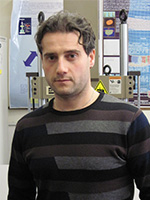
Antonio Gloria | Institute of Composite and Biomedical Materials – National Research Council of Italy, Italy
3D poly(e-caprolactone)-based scaffolds with enhanced and tailored performances
Antonio Gloria holds a PhD in Chemical, Materials and Production Engineering from the University of Naples “Federico II”. Since 2003, he collaborates with the Institute of Composite and Biomedical Materials, National Research Council of Italy. He also cooperated with the Department of Clinical Veterinary Sciences, University of Naples. Since 2004, he has been lecturing in some university academic courses (Biomaterials, Artificial Organs and Prostheses, Biomechanics and Design of Biomaterials). He is a full member of the American Nano Society, a member of the European Society for Biomaterials (ESB), the Italian Society of Biomaterials (SIB) and the American Chemical Society (ACS). In 2007/2008, he lectured a course entitled “Applications of hydrogels: the intervertebral disk” (BIOS – Research Doctorate School in BIOmolecular Sciences, University of Pisa). In 2009/2010, he made an invited presentation entitled “Polymer-based biomaterials: From tissue replacement to tissue regeneration”. He currently holds a researcher position at the Institute of Composite and Biomedical Materials (National Research Council, Naples, Italy). Today, he is Professor of “Biomaterials” at University of Catanzaro “Magna Graecia” , and Professor of “Artificial Organs and Prostheses” at University of Naples “Federico II”. He supervised Master and PhD students at the Department of Materials and Production Engineering (University of Naples), the Centre of Rapid and Sustainable Product Development (CDRSP, PIL), and the University of Catanzaro “Magna Graecia” (Italy). He received a Best Paper Award at the 4th International Conference on Advanced Research in Virtual and Rapid Prototyping (VRAP 2009), and chaired a session “Biomanufacturing” at VRAP 2011. He is Associate Member of CDRSP and Visiting Professor at the Master in Engineering Design and Product Development coordinated by CDRSP.
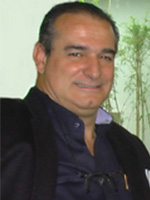
David José Casimiro de Andrade | University of Porto, Portugal
David Andrade holds a Degree in Medicine (MD) from the Medical Faculty of the University of Porto and a PhD in Pediatric Dentistry and Orthodontics, Faculty of Dentistry, University of Porto. David Andrade also has a post-graduation in Orthodontics from the University College of New York. He is a a Doctor of Dental Medicine (DMD) of the Faculty of Dental Medicine, University of Porto and Associate Professor with Aggregation and Ruler of Pediatric Dentistry, School of Dental Medicine, University of Porto. He is also the Director of the Specialization Program in Pediatric Dentistry, School of Dental Medicine, University of Porto, and Coordinator Professor of Continuing Education, Graduate and Master in Pediatric Dentistry. He is the Coordinator of several Research projects, author of three books and numerous publications in National and International journals. He supervised PhD, Master and undergraduate students, participated in academic juries, and integrated National and International Committees. He is a founding Partner of four National Associations and an International one. David Andrade has a particular interest in special patients. He is an Honorary Member of the Portuguese Association of People with Trisomy 21.
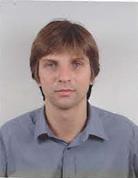
Frederico Castelo Ferreira | Universidade Técnica de Lisboa, Portugal
“Electrospinning: Potential for Application in Regenerative Medicine”
Frederico Ferreira holds a PhD in Chemical Engineering from Imperial College London and a MBA from the New University of Lisbon. He is Assistant Professor at the Department of Bioengineering in the scientific area of Biomaterials, Nanotechnology and Regenerative Medicine, at Instituto Superior Tecnico, Technical University of Lisbon. From 2004 to 2006, he was research associate at Imperial College London/Industrial Project with GlaxoSmithKline, and Imperial College London’s honorary research associate from 2006 to 2010. He is a member of the BioEngineering Research Group at the Institute for Biotechnology and Bioengineering. His current research interests include tailoring materials for stem cells applications, namely mimicking the natural extracellular matrix using nanofiber based polymeric 3D matrices and development of stimulus responsive systems for stem cell ex-vivo cultivation, engineering processes towards production of platelets from human stem cells, study fermentation based routes for jet biofuel production, and the development of new efficient and sustainable hybrid systems for purification of pharmaceutics, namely through membrane separations.

Giovanni Vozzi | University of Pisa, Italy
“Is it Possible to Construct an Optimal Scaffold for Regenerative Medicine Applications?”
In 2002, Giovanni Vozzi earned the PhD in Bioengineering from the Polytechnical of Milan and graduated from the University of Pisa in Electronic Engineering (section Biomedial Engineering) in 1998. From 2002 to 2003, he was fully engaged in the European Project BIOLOCH, in the Microfabrication of Biomimetic Actuators, at the Interdepartmental Research Center “E. Piaggio” of University of Pisa. From 2003 to 2006, he actively participated in the FIRB project entitled “Development of materials and technologies finalized to drug controlled release by endovascular devices” at the Institute for Composite and Biomedical materials (IMCB-CNR), Pisa. Since 2006, he is Researcher of Industrial Bioengineering at the Faculty of Engineering, University of Pisa. He has been collaborating with several international and national research centres, such as MIT, Università di Toyama, UTEP University, University of Twente, University of Bordeaux, Polytechnic Institute of Leiria, Univeristy Campus Suffolk, INEB, Università di Torino, Politecnico di Torino, Università Politecnica delle Marche (Ancona), CNR. He currently lectures at level I and II students of Biomedical Engineering, University of Pisa. He is currently supervising PhD students in Materials Engineering and Biomedical Engineering, and coordinates several undergraduate students and graduate fellows. He supervised 80 Master Degree theses in Biomedical Engineering. He is Editorial Board member of several Journals: Journal of Osteology e Biomaterials, the Open Nanoscience Journal and the Open Chemical Journal (Bentham Sciences Publishers). He acts as reviewer for some of the most relevant journals in Biomaterials: Acta Biomaterialia, Biosensors & Bioelectronics, Biomaterials, Biomedical Microdevices, Biotechnology Progress, Journal of Controlled Release, Materials Science & Engineering C, Open Chemical Engineering Journal, Sensors and Actuators, Tissue Engineering. He has delivered invited lectures in international scientific meetings. He has been visiting researcher at Microscale tissue Engineering lab at UCSD in San Diego. He is member of the Board Director of the International Society for Biofabrication, the Technical Committee on Biomanufacturing, the American Society of Mechanical Engineering, IEEE and the National Group of Bioengineering. He is author of more than 60 papers in International journals with a high IF, 4 chapters in books and 18 patents.
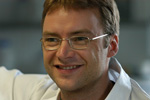
Jürgen Groll | University of Würzburg, Germany
“Hierarchical Materials for in-situ Tissue Engineering”
Jürgen Groll holds a PhD from the RWTH Aachen (summa cum laude) entitled “Specific and Directed Biomolecular Recognition on Star PEG Coatings” and a Diplom excellent in Chemistry studies from the University of Ulm. He made a research internship with Prof. Virgil Percec (UPENN, Philadelphia, USA). He is currently Full Professor (W3), chair and Head of the Department for functional materials in medicine and dentistry at the University of Würzburg, Germany. He also was Group leader (polymer chemistry, biomaterials, nanotechnology) at the RWTH Aachen, Germany, as well Senior Researcher (nanotechnology, functional materials and coatings) at Sustech GmbH & Co KG, Darmstadt, Germany. Jürgen Groll has 68 scientific publications (H-factor 21) and 10 patents, and delivered 31 invited lectures. He received several awards: the Reimund-Stadler Award from the German Chemical Society, the Bayer Early Excellence in Science Award (category materials), the Henkel Innovation Award, the Borchers-Plakette from the RWTH Aachen University, PhD thesis award from the German Society for Biomaterials and a Fellowship from the German National Academic Foundation. He is an Editorial Board member of the the Biofabrication Journal. ). He acts as reviewer for some of the most relevant journals in Biofabrication: Angewandte Chemie, Advanced Materials, Nano Letters, Advanced Functional Materials, Biomacromolecules, Small, Soft Matter, Macromolecular Bioscience, Progress in Polymer Science, and has evaluated projects for several important funding bodies: DFG, FWO, NWO, Carl Zeiss Foundation, Humboldt foundation.
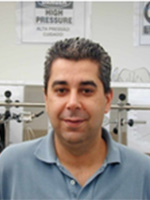
Hermínio C. de Sousa| University of Coimbra, Portugal
Supercritical – assisted foaming and mixing for implants and tissue engineering scaffolds
Hermínio de Sousa graduated in Chemical Engineering in 1992, and got his PhD in Physical Chemistry in 1997, both from the New University of Lisbon. He currently holds a Tenured Assistant Professor position (since 2005) at the University of Coimbra, Portugal. He is the Group leader of the Green and Sustainable Processes Laboratory, mainly focused on the use of “greener”, sustainable, safe, biomimetic and environmentally-friendly processes for the development of added-value products, materials and applications, mainly focused on the development of pharmaceutical, drug delivery, biomedical/tissue engineering and low VOC-emission materials applications, comprising the use of supercritical fluids, aqueous/ethanolic-based solvent system, natural-origin polymers and phytochemicals obtained through renewable sources, and biomimetic synthesis/processing strategies. He lectures courses in Biomaterials, Tissue Engineering, Drug Development, Pharmaceutical Processing, and Nanotechnologies to Master and PhD students. He has supervised several PhD and Master students, currently he is supervisor of 5 PhD students. He also lectured courses in Chemical Thermodynamics, Thermodynamics Applied to Materials, Physical Chemistry, Interfacial Phenomena, Thermophysical Properties, Polymeric Materials, Non-Conventional Separation Processes. He was also a Visiting Professor/Researcher in the University of Massachusetts (2007), in the Federal University of Pará, Brazil (2009), and in UNICAMP, Brazil (2011, 2012). Herminio de Sousa published more than 60 papers in renowned international peer-reviewed journals with a high impact factor, with more than 870 ISI citations (h-index is 17), 7 book chapters and 5 patents. He has presented more than 130 works in national/international scientific meetings, and acts as reviewer for more than 30 international journals. He recently received an award from the Nutrition Awards 2011 (Product and Service Innovation Category). He established numerous R&D collaborations with national/international research institutions worldwide. He was/is the PI of 6 national/international research projects (with an accumulated funding of more than 800000€). He also participates in 8 other research projects and established partnerships with industrial partners (pharmaceutical, agro-industrial and automotive).
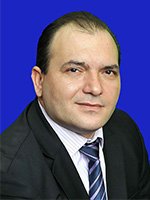
Iulian Antoniac | Head of Biomaterials Group, University Politehnica of Bucharest, Romania
“Biomimetic strategies and naturally derived materials used for bone tissue regeneration”
Iulian Antoniac holds a PhD in Materials Science from the University Politehnica of Bucharest. He also has two Master degrees, one from the Department of Advanced Procedures for Developing Special Alloys and the other from the Department of Fine Structure of Materials Research, both from University Politehnica of Bucharest. Iulian Antoniac is currently Vicepresident and a founder member of the Council of the Romanian Society for Biomaterials (SRB). He is the Head of the Biomaterials Group (BIOMAT) and member of the Board of Directors of the Department of Bioengineering and Biotechnology, University POLITEHNICA of Bucharest (2005-present). He is also the Head of the Interface Phenomenon Laboratory, Faculty Materials Science and Engineering, University Politehnica of Bucharest, Romania. From 2000 to 2002, he was Head of the Administrative Department and the Managementl Agency for Scientific Research, Innovation and Technological Transfer (AMCSIT) of the same University. He worked for some time at the Governmental Agency for Research AMCSIT, in the field of research and innovation. At BIOMAT, he has worked on metallic biomaterials used for different orthopedic and dental application, such as hip prosthesis, implants for trauma, dental prosthesis. He also works on the development of some research protocol used for both retrieval implants characterization and microscopically technique in the characterization of the interface biomaterials-tissue. Since 2005, Iulian Antoniac is associated with the Biomaterials program in the Faculty of Medical Engineering, which is focused in tissue engineering, scaffolds characterization, medical image processing, the developments of new implants for medical applications. His professional and scientific activity comprises: handbooks/textbooks (8); papers published in scientific journals (34); papers published in the proceedings of international or national conferences (140); inventions (6); participating in different international or national research projects (72); member of the scientific committee of different meetings (20); president of international conferences (6). He is a member of the International Editorial Board of some journals, and reviewer for different journals and biomaterial conferences. He received awards for lectures at international conferences, as well 4 invention awards, In 2005, he also received an award, the “Daniel Bunea”, from the Romanian Society for Biomaterials. Research interests: Microscopy for materials characterization, Metallic biomaterials for orthopedic application, Retrieval analysis of explants, Bone regeneration, Physical and chemical characterization of nano- and micro- particles for biomedical application, Biodegradable biomaterials. Present areas of research work: metallic biomaterials, surface modification, tissue engineering, biocomposites, scaffolds, interaction tissue-biomaterials, biointerfaces, retrieval analysis of explants, bone regeneration, magnetic nanoparticles.

Monica Mattioli Belmonte | Università Politecnica delle Marche, Dip. Scienze Cliniche e Molecolari , Italy
“Mesenchymal Stem Cells for Skeletal Regeneration: From bench to bed-side”
Monica Mattioli- Belmonte holds a PhD degree in materials compatibility (1995) and a first degree in Biological Sciences (1986) from Bologna University. She qualified for exercising the Profession of Biologist in 1987. From 1996 to 1998, she worked, first as a post-doc and subsequently as a contract researcher , at the Institute of Normal Human Morphology, School of Medicine, Ancona University. From 2000 to 2004, Dr Mattioli- Belmonte worked with a research grant (assegnista di ricerca) at the same Institute, doing research work and lecturing. In 2005, she became researcher of this Institute. Currently, she works at Histology Section of the Department of Clinical and Molecular Sciences (DISCLIMO), Università Politecnica delle Marche. Her research activity comprises the investigation and potential applications of biomaterials in orthopedics and dentistry. From 2010 to 2011, she coordinated a Research Unit of the national PRIN program: Engineering physiologically and pathologically relevant organ Models for the INvestigation of age related Diseases (MIND).This research work is mainly concerned the evaluation of toxicity and / or the biocompatibility of materials and 3D structures, through the use of static and dynamic culture conditions, continuous cell lines, primary cells or adult mesenchymal stem cells, coming from different origins and individual or co-culture culture approaches. Her research focuses on morphology and molecular biology fields, and is also based on light and scanning electron microscopy and atomic force microscopic techniques. She is co-author of several scientific publications on national and international journals. In November 2006, she became Associated Editorial Board Member of the Journal of Bioactive and Compatible Polymers. From January 2009 to December 2011, she was Associated Editor of the same journal. She has worked actively in different national and international programs: national (PRIN 1996,1999,2000; project CNR MSTAII 1999; project Cariverona 2009; RBAP10MLK7 FIRB) and international (Brite-NANOMED) ones. From 2010 to 2011, she coordinated a Research Unit of the national PRIN program: Engineering physiologically and pathologically relevant organ Models for the INvestigation of age related Diseases (MIND). She acts as a reviewer of several International Journals on biomaterials, regenerative medicine and tissue-engineering, such as Biomaterials, Acta Biomaterialia, Material Science & Engineering C, Materials Letters, Biomacromolecules, The Journal of Biomedical Material Research and Journal of Bioactive and Compatible Polymers. She is also a reviewer on Histology and Histopathology (Jiménez-Godoy, SA Murcia. Spain), Cell Health and Cytoskeleton (Dovepress) and Stem Cell and Development (Mary Ann Liebert, Inc.). She received a grant award for the “Best Researcher” in 2010. She is a member of the Italian Society of Anatomy and Histology, the Italian Society of Histochemistry and the Italian Society of Biomaterials

Paulo Bártolo, Centre for Rapid and Sustainable Product Development, Portugal
Biofabrication @ CDRsp
Paulo Bártolo has a PhD on Mechanical Engineering from the University of Reading (UK). Currently he is Professor on Advanced Manufacturing Processes at the Polytechnic Institute of Leiria (IPL, Portugal), Director of the Centre for Rapid and Sustainable Product Development at the Polytechnic Institute of Leiria, Professor of the Cátedra UNESCO of Biomaterials at the University of Habana (Cuba), Visiting Professor at Queensland University of Technology (Australia), Founder of the Portuguese-British Biomanufacturing Network, Member of the Board of Directors of the International Society for Biofabrication, Coordinator of the Iberoamerican Network on “Biomanufacturing: materials, processes and simulation (BIOFAB)” and Associate Member of CIRP (The International Academy for Production Engineering). Paulo Bártolo has been the Chair of the International Conference on Advanced Research in Virtual and Rapid Prototyping (VRAP 2011, VRAP2009, VRAP2007, VRAP 2005 and VRAP 2003) and Co-Chair of the ECOMAS Thematic Conference on Tissue Engineering. He is Editor-in-Chief of the “Virtual & Physical Prototyping” Journal and authored or co-authored more than 200 peer reviewed papers, 12 books, 65 book chapters and 12 patents.
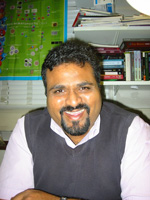
Suwan Jayasinghe | University College London, BioPhysics Group, UK
“Biospray approaches for regenerative biology/medicine and therapeutics”
Suwan N. Jayasinghe earned his PhD in 2003 in Materials sciences at Queen Mary, University of London. He is currently a group leader in the UCL Institute of Biomedical Engineering and the UCL Centre for Stem Cells and Regenerative Medicine. His group has made several discoveries having significance to advanced bioanalysis and diagnostics to tissue engineering and regenerative/therapeutic biology and medicine. These pioneering investigations are currently undergoing intense exploration for their exploitation in the clinic for repairing, replacing and rejuvenating damaged and/or ageing tissues/organs.
